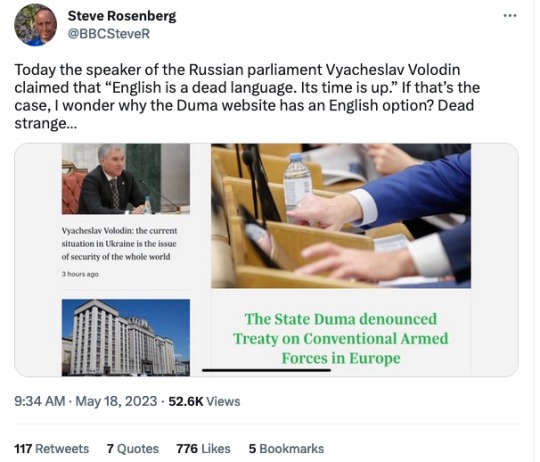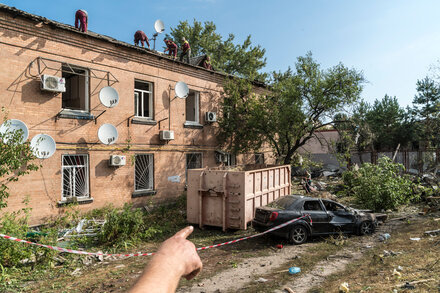#sasha dovzhyk
Photo

^^^ from Steve Rosenberg of the BBC.
One of the few things Russian officials are good for is their unintentionally hilarious irony.
As far as popularity of languages goes...
Mother Tongue: The Story of a Ukrainian Language Convert
How one Ukrainian woman made the switch from her native Russian tongue to Ukrainian
My mother tongue tastes like ashes. Things scorched by enemy fire, then soaked with rain, touched with rot, smelling of death. I felt the taste of my mother tongue most acutely while driving through Borodianka, Bucha, and Irpin two months after these Ukrainian towns in the Kyiv region were liberated by the Ukrainian army from the Russians’ “brotherly” embrace.
Russian is my mother tongue and liberation means ripping it out of my throat.
[ ... ]
Today, I savor the cacophony of Ukrainian proper, Ukrainian broken like my mother’s, and the hybridized form of Ukrainian-Russian called “surzhyk” when I’m walking down the streets in Kyiv and Lviv. The mass displacement caused by Russia‘s war has made Ukrainians from all parts of the country listen to each other and pick up new linguistic tricks. It is by pronouncing the Ukrainian word for a loaf of bread, “palianytsia,” that a friend is now distinguished from a foe at the military checkpoints around the country. Perfectly pronounced by Russophone Ukrainians, the combination of vowels and consonants makes Russians choke on the word connoting hospitality in the country they invaded.
There are reasons to believe the eastern Ukrainians most immediately affected by the war will choose to disentangle themselves from the invaders’ language, regardless of the difficulty. With the emptiness and openness of the Ukrainian steppe in the east comes the nomadic aspect of the easterner’s identity and the freedom to reinvent oneself. Maik Yohansen comes to mind, alongside Olena Stiazhkina and Volodymyr Rafeienko, contemporary writers who became linguistic converts to Ukrainian after Russia occupied their native city of Donetsk. For decades, Ukrainian identity in the east has been not a default setting but a choice, often made against the grain of one’s upbringing. Today, this choice is existential. Even those Ukrainians who are still unable to sever the linguistic cord which ties them to the enemy are unwilling to pass the Russian language to their children. The next generation will speak Ukrainian across the country.
Go ahead and learn a handful of Ukrainian words. The first thing you’ll notice is that the Ukrainian words for YES and NO are not the same as the Russian words.
Free Ukrainian Course
#invasion of ukraine#vyacheslav volodin#dead languages#english#steve rosenberg#sasha dovzhyk#surzhyk#ukrainian#russian#россия#вячеслав володин#дума#мертвый язык#русский язык#английский язык#владимир путин#путин хуйло#добей путина#геть з україни#саша довжик#українська мова#суржик#паляниця#україна переможе#будь сміливим як україна#слава україні!#героям слава!#зеленський виявився крутішим за путіна
14 notes
·
View notes
Text
Antonio Velardo shares: I’m a Ukrainian, and I Refuse to Compete for Your Attention by Sasha Dovzhyk
By Sasha Dovzhyk
Ukrainians have been infantilized by the need to vie for international interest.
Published: November 7, 2023 at 01:00AM
from NYT Opinion https://ift.tt/Um5ue10
via IFTTT

View On WordPress
0 notes
Text
PRESENTED BY Live Canon and the Ukrainian Institute London
The Trojan story retold by Ukraine’s pioneering feminist writer, Lesia Ukrainka; a UK premiere in an award-winning new translation.
Imagine if you could see the future, but no one would believe anything you said. This is Cassandra’s fate. Stuck in besieged Troy and knowing exactly how the war will end, Cassandra sees the destruction unfold around her, just as she knew it would.
First published in 1908, Lesia Ukrainka’s poetic drama retells the story of the Trojan war, from Cassandra’s perspective. Nina Murray’s fresh new translation of this monumental work won the Ukrainian Institute London’s 2021 Ukrainian literature in translation prize.
This premiere is brought to the stage by the Live Canon ensemble, who specialise in working with verse, and who have performed all over the world from Broadway to Abbey Road.
The production is directed by Helen Eastman, whose work has included The Cure at Troy (Delphi International Festival and world tour), Bridgetower (Hackney Empire and UK tour), Fair (Trafalgar Studios) and Bicycle Boy (GDIF and UK tour), and advising on many contemporary productions of Ancient Greek plays, most recently Paradise, by Kae Tempest at the National Theatre.
The production is presented by Live Canon and the Ukrainian Institute London, in association with the Polish Cultural Institute, the Lithuanian Cultural Institute, the Goethe-Institut and the Institut Français.
Post-Show Q&A
Sunday 9th October
Free to ticket-holders
Joining the panel is Helen Eastman (director of Cassandra), Nina Murray (translator of Cassandra), Sasha Dovzhyk (expert on Lesia Ukrainka; lecturer, University College London), Ola Rondiak (Ukrainian artist) and Olesya Khromeychuk (director of Ukrainian Institute London; historian and author).
On Saturday 8 October the matinee performance at 3pm will be free for displaced Ukrainians. Email [email protected] to book.
0 notes